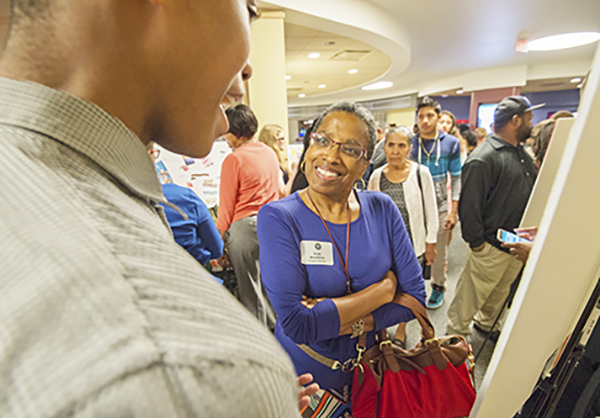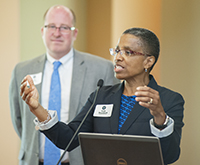
College Prep scholar Edwin McMurray had this backhanded compliment for Leah Merrifield, assistant vice chancellor for community engagement at Washington University in St. Louis:
“She has the energy of a much younger person,” said McMurray, a rising junior at Lutheran North High School in suburban St. Louis. “She is always so excited and enthusiastic whenever she sees us.”
Merrifield is energized by the program’s 70 scholars. She knows their parents, their career aspirations, their hidden talents.
“I feel blessed to be intimately involved in the lives of these students,” Merrifield said. “Once you build a trust, they will invite you into their whole lives. And lives are sometimes joyful, sometimes complicated, sometimes challenging. With teenagers, you can’t stay in a safe place of ‘hi-bye.’ You have to engage.”
A 20-year veteran of the university, Merrifield jokes that she can’t keep a job on campus. She has worked at Olin Business School, in the Office of the Chancellor and in the Office of Government and Community Relations – twice. The titles have been different, but the overarching goal has remained the same: to help Washington University be a more diverse and inclusive institution.

“Leah has been a steadfast advocate for creating an environment at Washington University that is welcoming to everyone,” said Rob Wild, PhD, associate vice chancellor for students and dean of the First Year Center. “Because of her time at Olin, Leah understands better than anyone the critical relationships that exist between the academic units and the central administrative units.”
Now, Merrifield leads the College Prep Program, which recently wrapped up its second summer. She is supported by her assistant director, Courtney Brewster, and a team of Washington University students who serve as program assistants.
The free program helps high-achieving high school students with limited resources get ready for life on a college campus. Students must commit to attend three consecutive summers living on the South 40, taking courses for college credit, learning how to craft an admissions essay and preparing for the ACT. And yet, Merrifield will not measure success in college acceptance letters, but in college diplomas.
“These students are smart enough to get into college, but do they have all the skills and confidence — the resiliency — to finish?” Merrifield asked.
“We are helping build that muscle,” she said. “If we succeed, there is the potential to impact so many people — the scholars, the families, generations after them, and the St. Louis region — because now we have more young professionals who are more highly educated, more connected to the community, more likely to be employed, more likely to help someone else.
“Everyone wins. It’s like being on ‘Oprah’ – ‘You get a car, you get a car, you get a car.’ ”
Merrifield sees herself in these scholars. She attended Chicago public schools and got good grades. But she arrived at Illinois Wesleyan University in downstate Bloomington, Ill., without some of the requisite skills to thrive.
“I had so much to learn,” said Merrifield, whose parents did not attend college. “I had to learn how to ask for help. I had to learn how to actually study. I had to learn time management. Like many first-generation students, I needed help with many things when I arrived at college.”
Merrifield studied risk management in college, but the business world left her cold. Her husband, Lloyd Winston, then an assistant basketball coach at Washington University, encouraged her to try something new. Merrifield got a job at Olin as an adviser.
“I figured I could do that until I figured out what comes next,” Merrifield said. “And then I started working in that job and I realized, ‘This is it. This is what I want to do.’
“I felt like what I did mattered, that I was serving others and that people listened to me. Colleagues would say, ‘What do you think?’ and I would go, ‘Well, what does the operations manual say?’ It was a so different from the business world. I thought I had died and gone to heaven.”
Merrifield followed Winston as he pursued coaching opportunities outside of St. Louis, but the couple ultimately returned to St. Louis for the reasons that draw many of us here — Midwestern friendliness, the low cost of living and the good schools. The couple enrolled their daughter, Rachel Winston, in the Ladue School District. Merrifield volunteered as a room parent; her husband served as Girl Scout parent helper.
Rachel recently earned her graduate degree in information studies from the University of Texas — the same school where Merrifield earned her graduate degree in higher education administration. To celebrate both her graduation and the couple’s 35th wedding anniversary, the family recently took a Mediterranean cruise.
“That’s when you know you’ve been married a long time,” Merrifield joked.
The family loves the Cardinals, attractions such as The Rep and The Black Rep, and restaurants Aya Sofia, Sugarfire and Mai Lee. But Merrifield also is keenly aware of St. Louis’ failings. So she was not surprised when the shooting of Michael Brown last August sparked protests in Ferguson, Mo. and beyond. But she was surprised so many people were surprised.
“From where I sit, it seemed pretty apparent there was great inequality across the region,” Merrifield said. “There was a lot of, ‘How could this happen?’ Well your life may be great, but if you have large swaths of people whose lives are not great — who do not have opportunity or education — something will happen.”
Washington University always planned to expand College Prep after its pilot year, but the unrest made it clear just how urgent the need this program had become. The second College Prep cohort nearly doubled in size with one-third of its members coming from Ferguson or nearby north St. Louis County communities.
“My fervent hope and prayer is that St. Louis institutions are awake now,” Merrifield said. “I don’t kid myself. I don’t think everything will be wonderful with rainbows and unicorns, but perhaps institutions like Washington University and others will take stock and do all they can to be a force for good.
“Do I wish we had done something like this sooner? Of course. But I feel blessed to work at a place that’s willing to put its resources behind the students of this region.”